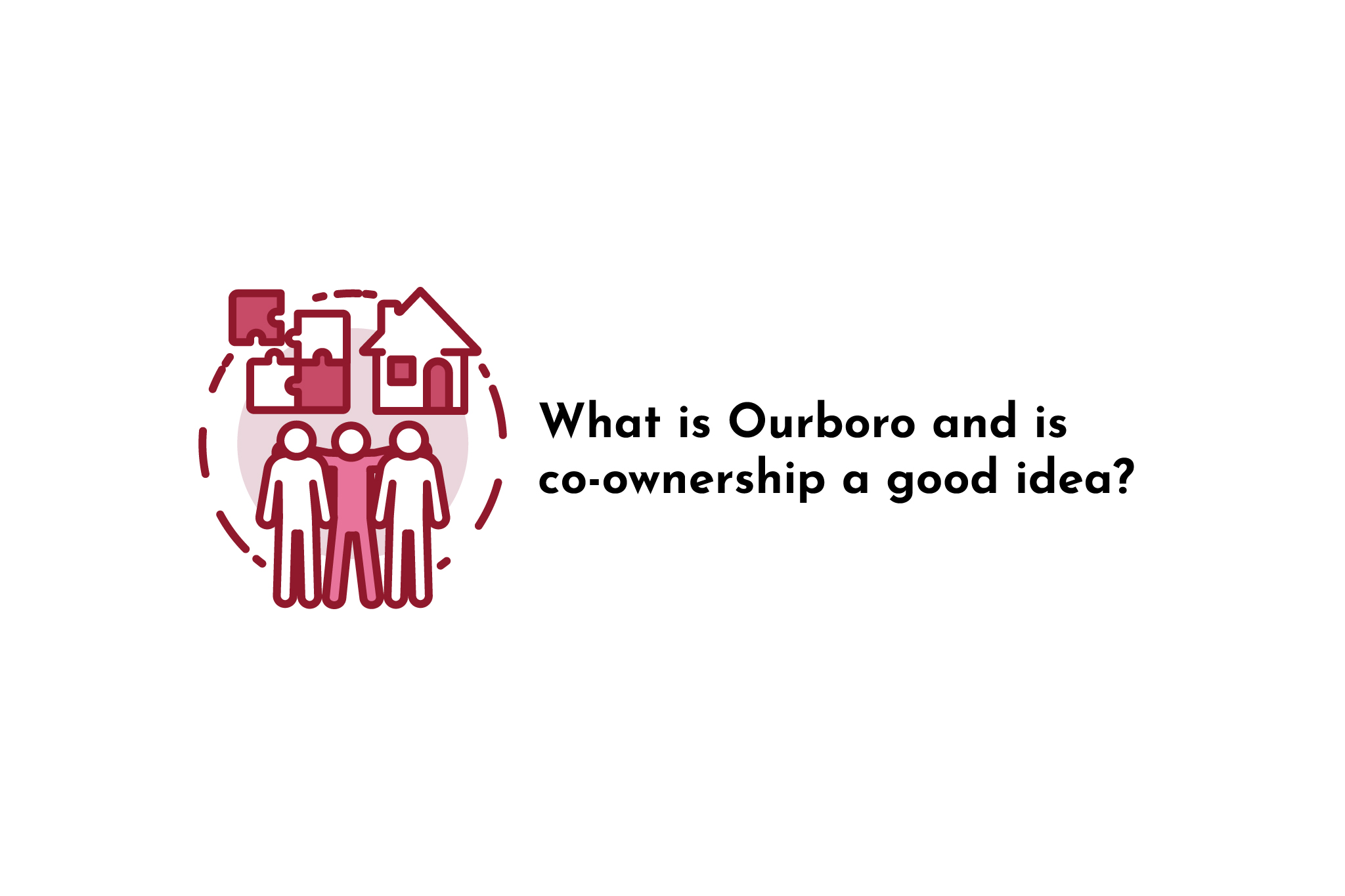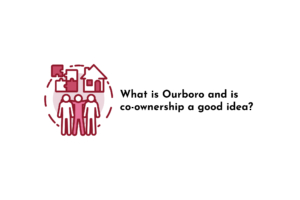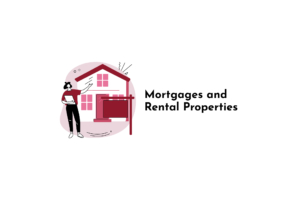Across Canada—and in certain cities in particular—the housing market is piping hot. Home prices are high, as is demand, and this can create hurdles for first-time home buyers looking to get their foot in the door. After all, not everyone has $100k lying around to make a downpayment! It’s no real surprise therefore that companies are proposing new solutions to capitalize on the hot housing market. Ourboro, a financial services firm based out of Toronto, is one of these companies, promising to help people buy their dream homes through a co-investment strategy.
In this article, we’re taking a close look at Ourboro’s co-ownership offering, how it works, and whether it makes sense for you as a homebuyer. We’ll also take a look at some alternative options that could be available to you, such as government incentive programs.
In This Article:
- Who is Ourboro?
- How does Ourboro work?
- What does co-ownership look like before selling?
- Is co-ownership worth it?
- Alternatives to Ourboro
Who is Ourboro?
Before we dive into the how, let’s answer the who. Ourboro was founded in Toronto in 2018 by Nick Pope and Norm Tasevski. Recognizing the steep housing prices in the city they lived in, the pair set out to create a business that would align homebuyers and investors and promote the concept of co-ownership.
The firm is based on the idea that homebuyers and real estate investors can team up in a mutually beneficial way. As the company writes on its website: “We realized we could turn homebuyers and real estate investors from competitors to partners through co-ownership. Homebuyers get the financial boost they need to buy the home they want today. Investors feel good knowing that the home, and their investment, is being well cared for.”
Today, the company functions as something of an intermediary, managing a pool of funds from real estate investors and linking up with homebuyers that need a financial boost for their down payment. It works exclusively with homebuyers in Ontario, focusing on the following areas: Toronto, Dufferin County, Durham region, Guelph, Halton region, Hamilton, Kitchener-Waterloo, London, Peel region, Simcoe County, and York region.
How does Ourboro work?
In the simplest terms, Ourboro offers a co-investment service that helps prospective home buyers increase their downpayment. According to the company, it will co-invest up to $250,000 in order for their clients to reach a 20% downpayment. Unlike a standard loan that must be repaid, Ourboro is actually buying into your home with you, retaining a share in the real estate. This means that when you eventually sell your property, they will receive a share of its sale price.
It’s a fairly simple concept at first glance. The percentage of the down payment that Ourboro contributes corresponds to the share in your property’s available equity. But it gets a bit more complex when you consider the details.
Let’s look at an example in which you are buying a $1 million property. In this case, if you put up $100,000 for the downpayment and Ourboro contributes $100,000, the company will retain a 50% stake in the property’s equity (since it paid 50% of the downpayment). Once the sale has gone through, Ourboro more or less steps back and you are wholly responsible for making mortgage payments over the course of the co-ownership.
When you eventually decide to sell the home, the sale proceeds are broken down in the following way:
- If you haven’t paid off your mortgage loan in full at time of sale, the bank is repaid first.
- Next, you will be repaid for any principal mortgage payments you made (though not interest payments).
- The remaining proceeds of the sale, or “net appreciation”, are then split 50/50 between you and Ourboro. (The ratio depends on their initial investment. For instance, if they contribute 60% of the down payment, they will receive 60% of the net appreciation.)
When you work with Ourboro, they offer a 30-year term. This means you can choose to sell your house at any point before 30 years. If you want to keep living in your home after this point, you will have to buy them out. If the home value does not appreciate by the sale time, both the home owner and Ourboro share in the loss. As an investment company, that is part of the risk they take on.
What does co-ownership look like before selling?
While that might clarify how the co-ownership relationship works during the homebuying and selling processes, you might be wondering how it works while you are actually living in your co-owned home. After all, you don’t really want to feel that you are a part-owner (or worse, a tenant!) in a property you’re paying a mortgage on.
According to Ourboro’s website, it functions as a “silent co-buying partner”, meaning that it won’t be checking in to see that your lawn is being mowed. This makes you responsible for maintaining the home, decorating, and what have you. It also makes you responsible for covering home ownership costs, including repairs, most taxes, and municipal fees.
Ourboro does provide an optional “home maintenance program”, which includes semi-annual property visits by a home maintenance company to ensure that any maintenance issues are being addressed. You will still have to pay for the repairs that the inspectors identify, but the idea is that any potential problems like leaks or cracks are identified early. (It’s worth noting, that you could be liable if any reported issues are not repaired in due course and the property value is affected.)
Homeowners also have the opportunity to access a “renovation credit” if they initiate renos that increase the property’s value, and can borrow from the “Homeowner’s Advance Fund” to cover the costs of unexpected repairs. This fund gives you access to three-months-worth of mortgage payments interest-free for 45 days.
Ultimately, Ourboro won’t interfere with your day-to-day, but it is still invested in increasing the value of the home. In other words, you don’t have to get approval for painting your walls, but you will have to let them know if you are planning any major work or property updates.
Is co-ownership worth it?
Co-ownership is not an ideal scenario for most home buyers, but with today’s high housing costs some might feel it’s their only way to purchase a home without compromising too much. On the plus side of Ourboro’s co-ownership model is that you will gain access to a greater number of homes, since down payment liquidity is a big barrier for many people. By boosting your down payment to 20%, you will also unlock lower mortgage payments and save on mortgage insurance.
Now for the limitations. The main downside of Ourboro’s method is that the eventual share of the property you receive might not reflect the big picture investment you’ve made. In other words, it’s likely you will put more resources into the property than Ourboro (through mortgage interest payments, taxes, and general maintenance), yet they could take home a greater share of the home sale proceeds depending on the percentage of the down payment they contributed.
Ourboro also limits who you can sign a mortgage agreement with. The company works with a third-party licensed mortgage broker as well as a select number of lenders. It also has a list of preferred real estate brokerages. This might not be a dealbreaker, but it is worth considering that your options will be laid out for you.
We also want to highlight that Ourboro’s service is intended for people buying their first property or a home they don’t intend to live in forever—a starter home, if you will. The company says that those who intend to stay put for the long-term can buy them out to fully own the property. In this case, it’s possible that the cost of buying them out could outweigh the benefits of the initial down payment support.
Alternatives to Ourboro
Ourboro is among the only companies to offer such a financial service in Ontario, but there are other ways to find support as a home buyer in Canada. For one, the Government of Canada has a First-Time Home Buyer Incentive program through the CMHC designed to give new homeowners a bit of a boost. Like Ourboro, this incentive is based on shared equity, however the government’s share is substantially less than the company’s ultimate stake.
With the First-Time Home Buyer Incentive, the Government of Canada provides 5-10% for a down payment for qualified home buyers. This downpayment boost helps to reduce your mortgage payments. Unlike Ourboro which retains a large share in your home (if it contributed 50% of your down payment, it will have 50% of the available equity), the government retains a share of either 5% or 10% (depending on the initial contribution).
Let’s take a look at an example. If you received a 5% incentive from the government on a $300,000 home ($15,000) and you sold your home ten years later for $500,000, you would owe the government $25,000. However, if your home value dropped to $250,000, you would owe the government $12,500. It’s a bit of a sliding scale, but ultimately the government share is substantially less than what Ourboro would claim.
If you’re interested in learning more about co-ownership or shared equity programs, we highly recommend speaking to an expert, such as one of our trusted advisors. We’re happy to help talk things out and explain how different incentives can benefit you on your home buying journey.







